


2019 Passat Variant (B8, facelift 2019)
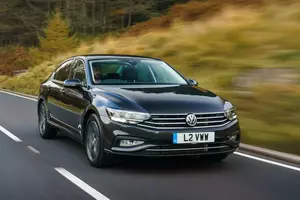
2019 Passat (B8, facelift 2019)
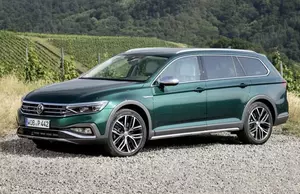
2019 Passat Alltrack (B8, facelift 2019)
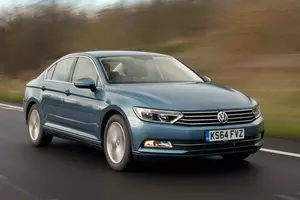
2015 Passat (B8)
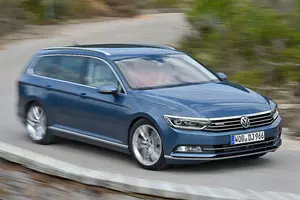
2015 Passat Variant (B8)
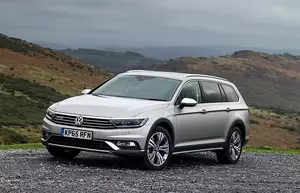
2015 Passat Alltrack (B8)
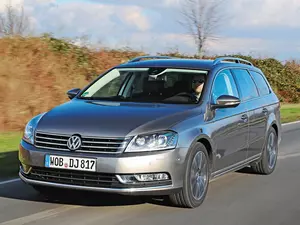
2010 Passat Variant (B7)
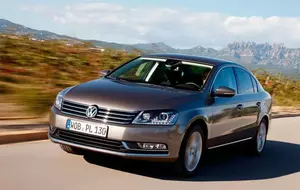
2010 Passat (B7)
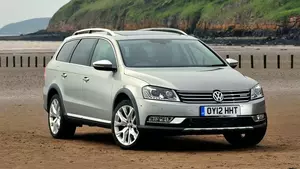
2010 Passat Alltrack (B7)
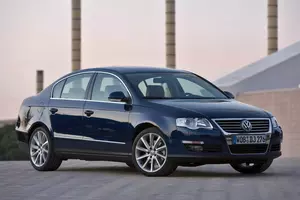
2005 Passat (B6)
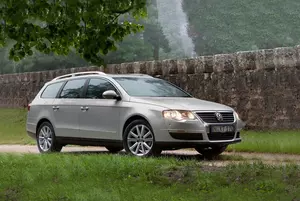
2005 Passat Variant (B6)
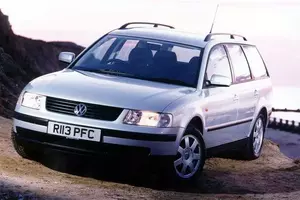
1997 Passat Variant (B5)
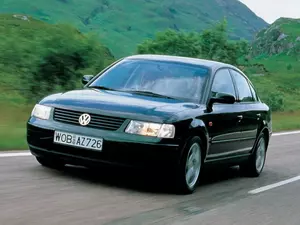
1996 Passat (B5)
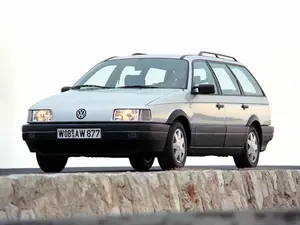
1988 Passat Variant B3,B4

1988 Passat (B3, B4)

1985 Passat Hatchback (B2; facelift 1985)

1981 Passat Variant (B2)

| Vehicle | Curb weight | Difference from world's smallest | Weight to power ratio | 0—60 mph acceleration ratio | Consumption ratio |
|---|---|---|---|---|---|
| 2.0 TDI |
1485 kg / 3274 lbs |
1060 kg (2337 lbs) heavier | 10 kg to 1 hp | 173 kg/s (381 lbs/s) | - |
| 1.6 TDI |
1470 kg / 3241 lbs |
1045 kg (2304 lbs) heavier | 12 kg to 1 hp | 143 kg/s (315 lbs/s) |
334 kg/L (736 lbs/L) |
| 2.0 TSI |
1495 kg / 3296 lbs |
1070 kg (2359 lbs) heavier | 8 kg to 1 hp | - |
234 kg/L (516 lbs/L) |
| 1.5 TSI |
1390 kg / 3065 lbs |
965 kg (2128 lbs) heavier | 9 kg to 1 hp | 164 kg/s (362 lbs/s) | - |
| Vehicle | 2.0 TDI |
|---|---|
| Curb weight |
1485 kg / 3274 lbs |
| Difference from world's smallest | 1060 kg (1060 lbs) heavier |
| Weight to power ratio | 10 kg to 1 hp |
| 0—60 mph acceleration ratio | 173 kg/s (381 lbs/s) |
| Consumption ratio | - |
| Vehicle | 1.6 TDI |
| Curb weight |
1470 kg / 3241 lbs |
| Difference from world's smallest | 1045 kg (1045 lbs) heavier |
| Weight to power ratio | 12 kg to 1 hp |
| 0—60 mph acceleration ratio | 143 kg/s (315 lbs/s) |
| Consumption ratio |
334 kg/L (736 lbs/L) |
| Vehicle | 2.0 TSI |
| Curb weight |
1495 kg / 3296 lbs |
| Difference from world's smallest | 1070 kg (1070 lbs) heavier |
| Weight to power ratio | 8 kg to 1 hp |
| 0—60 mph acceleration ratio | - |
| Consumption ratio |
234 kg/L (516 lbs/L) |
| Vehicle | 1.5 TSI |
| Curb weight |
1390 kg / 3065 lbs |
| Difference from world's smallest | 965 kg (965 lbs) heavier |
| Weight to power ratio | 9 kg to 1 hp |
| 0—60 mph acceleration ratio | 164 kg/s (362 lbs/s) |
| Consumption ratio | - |

| Vehicle | Curb weight | Difference from world's smallest | Weight to power ratio | 0—60 mph acceleration ratio | Consumption ratio |
|---|---|---|---|---|---|
| 2.0 TSI |
1570 kg / 3462 lbs |
1145 kg (2525 lbs) heavier | 6 kg to 1 hp | 296 kg/s (653 lbs/s) |
224 kg/L (494 lbs/L) |
| 1.6 TDI |
1425 kg / 3142 lbs |
1000 kg (2205 lbs) heavier | 12 kg to 1 hp | 138 kg/s (304 lbs/s) |
348 kg/L (767 lbs/L) |
| 2.0 TDI |
1475 kg / 3252 lbs |
1050 kg (2315 lbs) heavier | 10 kg to 1 hp | 174 kg/s (384 lbs/s) | - |
| 1.5 TSI |
1350 kg / 2977 lbs |
925 kg (2040 lbs) heavier | 9 kg to 1 hp | 163 kg/s (359 lbs/s) | - |
| Vehicle | 2.0 TSI |
|---|---|
| Curb weight |
1570 kg / 3462 lbs |
| Difference from world's smallest | 1145 kg (1145 lbs) heavier |
| Weight to power ratio | 6 kg to 1 hp |
| 0—60 mph acceleration ratio | 296 kg/s (653 lbs/s) |
| Consumption ratio |
224 kg/L (494 lbs/L) |
| Vehicle | 1.6 TDI |
| Curb weight |
1425 kg / 3142 lbs |
| Difference from world's smallest | 1000 kg (1000 lbs) heavier |
| Weight to power ratio | 12 kg to 1 hp |
| 0—60 mph acceleration ratio | 138 kg/s (304 lbs/s) |
| Consumption ratio |
348 kg/L (767 lbs/L) |
| Vehicle | 2.0 TDI |
| Curb weight |
1475 kg / 3252 lbs |
| Difference from world's smallest | 1050 kg (1050 lbs) heavier |
| Weight to power ratio | 10 kg to 1 hp |
| 0—60 mph acceleration ratio | 174 kg/s (384 lbs/s) |
| Consumption ratio | - |
| Vehicle | 1.5 TSI |
| Curb weight |
1350 kg / 2977 lbs |
| Difference from world's smallest | 925 kg (925 lbs) heavier |
| Weight to power ratio | 9 kg to 1 hp |
| 0—60 mph acceleration ratio | 163 kg/s (359 lbs/s) |
| Consumption ratio | - |

| Vehicle | Curb weight | Difference from world's smallest | Weight to power ratio | 0—60 mph acceleration ratio | Consumption ratio |
|---|---|---|---|---|---|
| 2.0 TDI |
1650 kg / 3638 lbs |
1225 kg (2701 lbs) heavier | 9 kg to 1 hp | 226 kg/s (498 lbs/s) |
324 kg/L (714 lbs/L) |
| 2.0 TSI |
1620 kg / 3572 lbs |
1195 kg (2635 lbs) heavier | 6 kg to 1 hp | 295 kg/s (650 lbs/s) |
228 kg/L (503 lbs/L) |
| Vehicle | 2.0 TDI |
|---|---|
| Curb weight |
1650 kg / 3638 lbs |
| Difference from world's smallest | 1225 kg (1225 lbs) heavier |
| Weight to power ratio | 9 kg to 1 hp |
| 0—60 mph acceleration ratio | 226 kg/s (498 lbs/s) |
| Consumption ratio |
324 kg/L (714 lbs/L) |
| Vehicle | 2.0 TSI |
| Curb weight |
1620 kg / 3572 lbs |
| Difference from world's smallest | 1195 kg (1195 lbs) heavier |
| Weight to power ratio | 6 kg to 1 hp |
| 0—60 mph acceleration ratio | 295 kg/s (650 lbs/s) |
| Consumption ratio |
228 kg/L (503 lbs/L) |

| Vehicle | Curb weight | Difference from world's smallest | Weight to power ratio | 0—60 mph acceleration ratio | Consumption ratio |
|---|---|---|---|---|---|
| 1.6 TDI |
1459 kg / 3217 lbs |
1034 kg (2280 lbs) heavier | 12 kg to 1 hp | 142 kg/s (313 lbs/s) |
365 kg/L (805 lbs/L) |
| 1.4 TSI |
1387 kg / 3058 lbs |
962 kg (2121 lbs) heavier | 9 kg to 1 hp | 173 kg/s (381 lbs/s) |
277 kg/L (611 lbs/L) |
| 2.0 TDI |
1505 kg / 3319 lbs |
1080 kg (2382 lbs) heavier | 8 kg to 1 hp | 201 kg/s (443 lbs/s) |
367 kg/L (809 lbs/L) |
| 2.0 BiTDI |
1721 kg / 3795 lbs |
1296 kg (2858 lbs) heavier | 7 kg to 1 hp | 297 kg/s (655 lbs/s) |
325 kg/L (717 lbs/L) |
| 1.8 TSI |
1468 kg / 3237 lbs |
1043 kg (2300 lbs) heavier | 8 kg to 1 hp | 201 kg/s (443 lbs/s) |
249 kg/L (549 lbs/L) |
| 2.0 TSI |
1650 kg / 3638 lbs |
1225 kg (2701 lbs) heavier | 6 kg to 1 hp | 311 kg/s (686 lbs/s) |
236 kg/L (520 lbs/L) |
| GTE 1.4 TSI |
1647 kg / 3632 lbs |
1222 kg (2695 lbs) heavier | 11 kg to 1 hp | 235 kg/s (518 lbs/s) |
969 kg/L (2137 lbs/L) |
| 1.5 TSI |
1405 kg / 3098 lbs |
980 kg (2161 lbs) heavier | 9 kg to 1 hp | 171 kg/s (377 lbs/s) |
275 kg/L (606 lbs/L) |
| Vehicle | 1.6 TDI |
|---|---|
| Curb weight |
1459 kg / 3217 lbs |
| Difference from world's smallest | 1034 kg (1034 lbs) heavier |
| Weight to power ratio | 12 kg to 1 hp |
| 0—60 mph acceleration ratio | 142 kg/s (313 lbs/s) |
| Consumption ratio |
365 kg/L (805 lbs/L) |
| Vehicle | 1.4 TSI |
| Curb weight |
1387 kg / 3058 lbs |
| Difference from world's smallest | 962 kg (962 lbs) heavier |
| Weight to power ratio | 9 kg to 1 hp |
| 0—60 mph acceleration ratio | 173 kg/s (381 lbs/s) |
| Consumption ratio |
277 kg/L (611 lbs/L) |
| Vehicle | 2.0 TDI |
| Curb weight |
1505 kg / 3319 lbs |
| Difference from world's smallest | 1080 kg (1080 lbs) heavier |
| Weight to power ratio | 8 kg to 1 hp |
| 0—60 mph acceleration ratio | 201 kg/s (443 lbs/s) |
| Consumption ratio |
367 kg/L (809 lbs/L) |
| Vehicle | 2.0 BiTDI |
| Curb weight |
1721 kg / 3795 lbs |
| Difference from world's smallest | 1296 kg (1296 lbs) heavier |
| Weight to power ratio | 7 kg to 1 hp |
| 0—60 mph acceleration ratio | 297 kg/s (655 lbs/s) |
| Consumption ratio |
325 kg/L (717 lbs/L) |
| Vehicle | 1.8 TSI |
| Curb weight |
1468 kg / 3237 lbs |
| Difference from world's smallest | 1043 kg (1043 lbs) heavier |
| Weight to power ratio | 8 kg to 1 hp |
| 0—60 mph acceleration ratio | 201 kg/s (443 lbs/s) |
| Consumption ratio |
249 kg/L (549 lbs/L) |
| Vehicle | 2.0 TSI |
| Curb weight |
1650 kg / 3638 lbs |
| Difference from world's smallest | 1225 kg (1225 lbs) heavier |
| Weight to power ratio | 6 kg to 1 hp |
| 0—60 mph acceleration ratio | 311 kg/s (686 lbs/s) |
| Consumption ratio |
236 kg/L (520 lbs/L) |
| Vehicle | GTE 1.4 TSI |
| Curb weight |
1647 kg / 3632 lbs |
| Difference from world's smallest | 1222 kg (1222 lbs) heavier |
| Weight to power ratio | 11 kg to 1 hp |
| 0—60 mph acceleration ratio | 235 kg/s (518 lbs/s) |
| Consumption ratio |
969 kg/L (2137 lbs/L) |
| Vehicle | 1.5 TSI |
| Curb weight |
1405 kg / 3098 lbs |
| Difference from world's smallest | 980 kg (980 lbs) heavier |
| Weight to power ratio | 9 kg to 1 hp |
| 0—60 mph acceleration ratio | 171 kg/s (377 lbs/s) |
| Consumption ratio |
275 kg/L (606 lbs/L) |

| Vehicle | Curb weight | Difference from world's smallest | Weight to power ratio | 0—60 mph acceleration ratio | Consumption ratio |
|---|---|---|---|---|---|
| 1.4 TSI |
1462 kg / 3224 lbs |
1037 kg (2287 lbs) heavier | 10 kg to 1 hp | 172 kg/s (379 lbs/s) |
252 kg/L (556 lbs/L) |
| 1.6 TDI |
1430 kg / 3153 lbs |
1005 kg (2216 lbs) heavier | 12 kg to 1 hp | 136 kg/s (300 lbs/s) |
386 kg/L (851 lbs/L) |
| 2.0 TDI |
1556 kg / 3431 lbs |
1131 kg (2494 lbs) heavier | 10 kg to 1 hp | 183 kg/s (404 lbs/s) |
331 kg/L (730 lbs/L) |
| 2.0 BiTDI |
1735 kg / 3826 lbs |
1310 kg (2889 lbs) heavier | 7 kg to 1 hp | 289 kg/s (637 lbs/s) |
321 kg/L (708 lbs/L) |
| 1.8 TSI |
1430 kg / 3153 lbs |
1005 kg (2216 lbs) heavier | 8 kg to 1 hp | 186 kg/s (410 lbs/s) |
247 kg/L (545 lbs/L) |
| 2.0 TSI |
1675 kg / 3693 lbs |
1250 kg (2756 lbs) heavier | 6 kg to 1 hp | 310 kg/s (684 lbs/s) |
236 kg/L (520 lbs/L) |
| GTE 1.4 TSI |
1660 kg / 3660 lbs |
1235 kg (2723 lbs) heavier | 11 kg to 1 hp | 231 kg/s (509 lbs/s) |
976 kg/L (2152 lbs/L) |
| 1.5 TSI |
1465 kg / 3230 lbs |
1040 kg (2293 lbs) heavier | 10 kg to 1 hp | 174 kg/s (384 lbs/s) |
266 kg/L (587 lbs/L) |
| Vehicle | 1.4 TSI |
|---|---|
| Curb weight |
1462 kg / 3224 lbs |
| Difference from world's smallest | 1037 kg (1037 lbs) heavier |
| Weight to power ratio | 10 kg to 1 hp |
| 0—60 mph acceleration ratio | 172 kg/s (379 lbs/s) |
| Consumption ratio |
252 kg/L (556 lbs/L) |
| Vehicle | 1.6 TDI |
| Curb weight |
1430 kg / 3153 lbs |
| Difference from world's smallest | 1005 kg (1005 lbs) heavier |
| Weight to power ratio | 12 kg to 1 hp |
| 0—60 mph acceleration ratio | 136 kg/s (300 lbs/s) |
| Consumption ratio |
386 kg/L (851 lbs/L) |
| Vehicle | 2.0 TDI |
| Curb weight |
1556 kg / 3431 lbs |
| Difference from world's smallest | 1131 kg (1131 lbs) heavier |
| Weight to power ratio | 10 kg to 1 hp |
| 0—60 mph acceleration ratio | 183 kg/s (404 lbs/s) |
| Consumption ratio |
331 kg/L (730 lbs/L) |
| Vehicle | 2.0 BiTDI |
| Curb weight |
1735 kg / 3826 lbs |
| Difference from world's smallest | 1310 kg (1310 lbs) heavier |
| Weight to power ratio | 7 kg to 1 hp |
| 0—60 mph acceleration ratio | 289 kg/s (637 lbs/s) |
| Consumption ratio |
321 kg/L (708 lbs/L) |
| Vehicle | 1.8 TSI |
| Curb weight |
1430 kg / 3153 lbs |
| Difference from world's smallest | 1005 kg (1005 lbs) heavier |
| Weight to power ratio | 8 kg to 1 hp |
| 0—60 mph acceleration ratio | 186 kg/s (410 lbs/s) |
| Consumption ratio |
247 kg/L (545 lbs/L) |
| Vehicle | 2.0 TSI |
| Curb weight |
1675 kg / 3693 lbs |
| Difference from world's smallest | 1250 kg (1250 lbs) heavier |
| Weight to power ratio | 6 kg to 1 hp |
| 0—60 mph acceleration ratio | 310 kg/s (684 lbs/s) |
| Consumption ratio |
236 kg/L (520 lbs/L) |
| Vehicle | GTE 1.4 TSI |
| Curb weight |
1660 kg / 3660 lbs |
| Difference from world's smallest | 1235 kg (1235 lbs) heavier |
| Weight to power ratio | 11 kg to 1 hp |
| 0—60 mph acceleration ratio | 231 kg/s (509 lbs/s) |
| Consumption ratio |
976 kg/L (2152 lbs/L) |
| Vehicle | 1.5 TSI |
| Curb weight |
1465 kg / 3230 lbs |
| Difference from world's smallest | 1040 kg (1040 lbs) heavier |
| Weight to power ratio | 10 kg to 1 hp |
| 0—60 mph acceleration ratio | 174 kg/s (384 lbs/s) |
| Consumption ratio |
266 kg/L (587 lbs/L) |

| Vehicle | Curb weight | Difference from world's smallest | Weight to power ratio | 0—60 mph acceleration ratio | Consumption ratio |
|---|---|---|---|---|---|
| 2.0 TDI |
1630 kg / 3594 lbs |
1205 kg (2657 lbs) heavier | 9 kg to 1 hp | 214 kg/s (472 lbs/s) |
313 kg/L (690 lbs/L) |
| 2.0 TSI |
1695 kg / 3737 lbs |
1270 kg (2800 lbs) heavier | 6 kg to 1 hp | 308 kg/s (679 lbs/s) |
239 kg/L (527 lbs/L) |
| 2.0 BiTDI |
1701 kg / 3751 lbs |
1276 kg (2814 lbs) heavier | 7 kg to 1 hp | 279 kg/s (615 lbs/s) |
309 kg/L (681 lbs/L) |
| Vehicle | 2.0 TDI |
|---|---|
| Curb weight |
1630 kg / 3594 lbs |
| Difference from world's smallest | 1205 kg (1205 lbs) heavier |
| Weight to power ratio | 9 kg to 1 hp |
| 0—60 mph acceleration ratio | 214 kg/s (472 lbs/s) |
| Consumption ratio |
313 kg/L (690 lbs/L) |
| Vehicle | 2.0 TSI |
| Curb weight |
1695 kg / 3737 lbs |
| Difference from world's smallest | 1270 kg (1270 lbs) heavier |
| Weight to power ratio | 6 kg to 1 hp |
| 0—60 mph acceleration ratio | 308 kg/s (679 lbs/s) |
| Consumption ratio |
239 kg/L (527 lbs/L) |
| Vehicle | 2.0 BiTDI |
| Curb weight |
1701 kg / 3751 lbs |
| Difference from world's smallest | 1276 kg (1276 lbs) heavier |
| Weight to power ratio | 7 kg to 1 hp |
| 0—60 mph acceleration ratio | 279 kg/s (615 lbs/s) |
| Consumption ratio |
309 kg/L (681 lbs/L) |

| Vehicle | Curb weight | Difference from world's smallest | Weight to power ratio | 0—60 mph acceleration ratio | Consumption ratio |
|---|---|---|---|---|---|
| 2.0 TSI |
1582 kg / 3488 lbs |
1157 kg (2551 lbs) heavier | 7 kg to 1 hp | 217 kg/s (478 lbs/s) |
200 kg/L (441 lbs/L) |
| 1.8 TSI |
1551 kg / 3420 lbs |
1126 kg (2483 lbs) heavier | 10 kg to 1 hp | 187 kg/s (412 lbs/s) |
218 kg/L (481 lbs/L) |
| 3.6 V6 FSI |
1773 kg / 3909 lbs |
1348 kg (2972 lbs) heavier | 6 kg to 1 hp | 328 kg/s (723 lbs/s) |
191 kg/L (421 lbs/L) |
| 1.4 TSI |
1647 kg / 3632 lbs |
1222 kg (2695 lbs) heavier | 11 kg to 1 hp | 175 kg/s (386 lbs/s) |
242 kg/L (534 lbs/L) |
| 2.0 TDI |
1594 kg / 3515 lbs |
1169 kg (2578 lbs) heavier | 9 kg to 1 hp | 190 kg/s (419 lbs/s) |
339 kg/L (747 lbs/L) |
| Vehicle | 2.0 TSI |
|---|---|
| Curb weight |
1582 kg / 3488 lbs |
| Difference from world's smallest | 1157 kg (1157 lbs) heavier |
| Weight to power ratio | 7 kg to 1 hp |
| 0—60 mph acceleration ratio | 217 kg/s (478 lbs/s) |
| Consumption ratio |
200 kg/L (441 lbs/L) |
| Vehicle | 1.8 TSI |
| Curb weight |
1551 kg / 3420 lbs |
| Difference from world's smallest | 1126 kg (1126 lbs) heavier |
| Weight to power ratio | 10 kg to 1 hp |
| 0—60 mph acceleration ratio | 187 kg/s (412 lbs/s) |
| Consumption ratio |
218 kg/L (481 lbs/L) |
| Vehicle | 3.6 V6 FSI |
| Curb weight |
1773 kg / 3909 lbs |
| Difference from world's smallest | 1348 kg (1348 lbs) heavier |
| Weight to power ratio | 6 kg to 1 hp |
| 0—60 mph acceleration ratio | 328 kg/s (723 lbs/s) |
| Consumption ratio |
191 kg/L (421 lbs/L) |
| Vehicle | 1.4 TSI |
| Curb weight |
1647 kg / 3632 lbs |
| Difference from world's smallest | 1222 kg (1222 lbs) heavier |
| Weight to power ratio | 11 kg to 1 hp |
| 0—60 mph acceleration ratio | 175 kg/s (386 lbs/s) |
| Consumption ratio |
242 kg/L (534 lbs/L) |
| Vehicle | 2.0 TDI |
| Curb weight |
1594 kg / 3515 lbs |
| Difference from world's smallest | 1169 kg (1169 lbs) heavier |
| Weight to power ratio | 9 kg to 1 hp |
| 0—60 mph acceleration ratio | 190 kg/s (419 lbs/s) |
| Consumption ratio |
339 kg/L (747 lbs/L) |

| Vehicle | Curb weight | Difference from world's smallest | Weight to power ratio | 0—60 mph acceleration ratio | Consumption ratio |
|---|---|---|---|---|---|
| 1.8 TSI |
1502 kg / 3312 lbs |
1077 kg (2375 lbs) heavier | 9 kg to 1 hp | 185 kg/s (408 lbs/s) |
218 kg/L (481 lbs/L) |
| 2.0 TSI |
1544 kg / 3405 lbs |
1119 kg (2468 lbs) heavier | 7 kg to 1 hp | 214 kg/s (472 lbs/s) |
201 kg/L (443 lbs/L) |
| 1.4 TSI |
1619 kg / 3570 lbs |
1194 kg (2633 lbs) heavier | 11 kg to 1 hp | 174 kg/s (384 lbs/s) |
238 kg/L (525 lbs/L) |
| 3.6 V6 FSI |
1722 kg / 3797 lbs |
1297 kg (2860 lbs) heavier | 6 kg to 1 hp | 331 kg/s (730 lbs/s) |
185 kg/L (408 lbs/L) |
| 2.0 TDI |
1646 kg / 3629 lbs |
1221 kg (2692 lbs) heavier | 10 kg to 1 hp | 203 kg/s (448 lbs/s) |
294 kg/L (648 lbs/L) |
| Vehicle | 1.8 TSI |
|---|---|
| Curb weight |
1502 kg / 3312 lbs |
| Difference from world's smallest | 1077 kg (1077 lbs) heavier |
| Weight to power ratio | 9 kg to 1 hp |
| 0—60 mph acceleration ratio | 185 kg/s (408 lbs/s) |
| Consumption ratio |
218 kg/L (481 lbs/L) |
| Vehicle | 2.0 TSI |
| Curb weight |
1544 kg / 3405 lbs |
| Difference from world's smallest | 1119 kg (1119 lbs) heavier |
| Weight to power ratio | 7 kg to 1 hp |
| 0—60 mph acceleration ratio | 214 kg/s (472 lbs/s) |
| Consumption ratio |
201 kg/L (443 lbs/L) |
| Vehicle | 1.4 TSI |
| Curb weight |
1619 kg / 3570 lbs |
| Difference from world's smallest | 1194 kg (1194 lbs) heavier |
| Weight to power ratio | 11 kg to 1 hp |
| 0—60 mph acceleration ratio | 174 kg/s (384 lbs/s) |
| Consumption ratio |
238 kg/L (525 lbs/L) |
| Vehicle | 3.6 V6 FSI |
| Curb weight |
1722 kg / 3797 lbs |
| Difference from world's smallest | 1297 kg (1297 lbs) heavier |
| Weight to power ratio | 6 kg to 1 hp |
| 0—60 mph acceleration ratio | 331 kg/s (730 lbs/s) |
| Consumption ratio |
185 kg/L (408 lbs/L) |
| Vehicle | 2.0 TDI |
| Curb weight |
1646 kg / 3629 lbs |
| Difference from world's smallest | 1221 kg (1221 lbs) heavier |
| Weight to power ratio | 10 kg to 1 hp |
| 0—60 mph acceleration ratio | 203 kg/s (448 lbs/s) |
| Consumption ratio |
294 kg/L (648 lbs/L) |

| Vehicle | Curb weight | Difference from world's smallest | Weight to power ratio | 0—60 mph acceleration ratio | Consumption ratio |
|---|---|---|---|---|---|
| 1.8 TSI |
1590 kg / 3506 lbs |
1165 kg (2569 lbs) heavier | 10 kg to 1 hp | 187 kg/s (412 lbs/s) |
206 kg/L (454 lbs/L) |
| 2.0 TDI |
1726 kg / 3806 lbs |
1301 kg (2869 lbs) heavier | 10 kg to 1 hp | 208 kg/s (459 lbs/s) |
293 kg/L (646 lbs/L) |
| 2.0 TSI |
1707 kg / 3764 lbs |
1282 kg (2827 lbs) heavier | 8 kg to 1 hp | 231 kg/s (509 lbs/s) |
198 kg/L (437 lbs/L) |
| Vehicle | 1.8 TSI |
|---|---|
| Curb weight |
1590 kg / 3506 lbs |
| Difference from world's smallest | 1165 kg (1165 lbs) heavier |
| Weight to power ratio | 10 kg to 1 hp |
| 0—60 mph acceleration ratio | 187 kg/s (412 lbs/s) |
| Consumption ratio |
206 kg/L (454 lbs/L) |
| Vehicle | 2.0 TDI |
| Curb weight |
1726 kg / 3806 lbs |
| Difference from world's smallest | 1301 kg (1301 lbs) heavier |
| Weight to power ratio | 10 kg to 1 hp |
| 0—60 mph acceleration ratio | 208 kg/s (459 lbs/s) |
| Consumption ratio |
293 kg/L (646 lbs/L) |
| Vehicle | 2.0 TSI |
| Curb weight |
1707 kg / 3764 lbs |
| Difference from world's smallest | 1282 kg (1282 lbs) heavier |
| Weight to power ratio | 8 kg to 1 hp |
| 0—60 mph acceleration ratio | 231 kg/s (509 lbs/s) |
| Consumption ratio |
198 kg/L (437 lbs/L) |

| Vehicle | Curb weight | Difference from world's smallest | Weight to power ratio | 0—60 mph acceleration ratio | Consumption ratio |
|---|---|---|---|---|---|
| 2.0 FSI |
1389 kg / 3063 lbs |
964 kg (2126 lbs) heavier | 9 kg to 1 hp | 143 kg/s (315 lbs/s) |
163 kg/L (359 lbs/L) |
| 2.0 TDI |
1457 kg / 3213 lbs |
1032 kg (2276 lbs) heavier | 9 kg to 1 hp | 176 kg/s (388 lbs/s) |
239 kg/L (527 lbs/L) |
| 2.0 TDI 16V |
1454 kg / 3206 lbs |
1029 kg (2269 lbs) heavier | 10 kg to 1 hp | 156 kg/s (344 lbs/s) |
251 kg/L (553 lbs/L) |
| 1.4 TSI |
1348 kg / 2972 lbs |
923 kg (2035 lbs) heavier | 11 kg to 1 hp | 135 kg/s (298 lbs/s) |
211 kg/L (465 lbs/L) |
| 1.6 FSI |
1348 kg / 2972 lbs |
923 kg (2035 lbs) heavier | 12 kg to 1 hp | 125 kg/s (276 lbs/s) |
180 kg/L (397 lbs/L) |
| 1.6 MPI |
1418 kg / 3127 lbs |
993 kg (2190 lbs) heavier | 14 kg to 1 hp | 120 kg/s (265 lbs/s) |
187 kg/L (412 lbs/L) |
| 1.8 TSI |
1492 kg / 3290 lbs |
1067 kg (2353 lbs) heavier | 9 kg to 1 hp | 173 kg/s (381 lbs/s) |
182 kg/L (401 lbs/L) |
| 1.9 TDI |
1422 kg / 3136 lbs |
997 kg (2199 lbs) heavier | 14 kg to 1 hp | 124 kg/s (273 lbs/s) |
254 kg/L (560 lbs/L) |
| 2.0 TFSI |
1389 kg / 3063 lbs |
964 kg (2126 lbs) heavier | 7 kg to 1 hp | 188 kg/s (415 lbs/s) |
163 kg/L (359 lbs/L) |
| 3.2 FSI |
1492 kg / 3290 lbs |
1067 kg (2353 lbs) heavier | 6 kg to 1 hp | 226 kg/s (498 lbs/s) |
152 kg/L (335 lbs/L) |
| Vehicle | 2.0 FSI |
|---|---|
| Curb weight |
1389 kg / 3063 lbs |
| Difference from world's smallest | 964 kg (964 lbs) heavier |
| Weight to power ratio | 9 kg to 1 hp |
| 0—60 mph acceleration ratio | 143 kg/s (315 lbs/s) |
| Consumption ratio |
163 kg/L (359 lbs/L) |
| Vehicle | 2.0 TDI |
| Curb weight |
1457 kg / 3213 lbs |
| Difference from world's smallest | 1032 kg (1032 lbs) heavier |
| Weight to power ratio | 9 kg to 1 hp |
| 0—60 mph acceleration ratio | 176 kg/s (388 lbs/s) |
| Consumption ratio |
239 kg/L (527 lbs/L) |
| Vehicle | 2.0 TDI 16V |
| Curb weight |
1454 kg / 3206 lbs |
| Difference from world's smallest | 1029 kg (1029 lbs) heavier |
| Weight to power ratio | 10 kg to 1 hp |
| 0—60 mph acceleration ratio | 156 kg/s (344 lbs/s) |
| Consumption ratio |
251 kg/L (553 lbs/L) |
| Vehicle | 1.4 TSI |
| Curb weight |
1348 kg / 2972 lbs |
| Difference from world's smallest | 923 kg (923 lbs) heavier |
| Weight to power ratio | 11 kg to 1 hp |
| 0—60 mph acceleration ratio | 135 kg/s (298 lbs/s) |
| Consumption ratio |
211 kg/L (465 lbs/L) |
| Vehicle | 1.6 FSI |
| Curb weight |
1348 kg / 2972 lbs |
| Difference from world's smallest | 923 kg (923 lbs) heavier |
| Weight to power ratio | 12 kg to 1 hp |
| 0—60 mph acceleration ratio | 125 kg/s (276 lbs/s) |
| Consumption ratio |
180 kg/L (397 lbs/L) |
| Vehicle | 1.6 MPI |
| Curb weight |
1418 kg / 3127 lbs |
| Difference from world's smallest | 993 kg (993 lbs) heavier |
| Weight to power ratio | 14 kg to 1 hp |
| 0—60 mph acceleration ratio | 120 kg/s (265 lbs/s) |
| Consumption ratio |
187 kg/L (412 lbs/L) |
| Vehicle | 1.8 TSI |
| Curb weight |
1492 kg / 3290 lbs |
| Difference from world's smallest | 1067 kg (1067 lbs) heavier |
| Weight to power ratio | 9 kg to 1 hp |
| 0—60 mph acceleration ratio | 173 kg/s (381 lbs/s) |
| Consumption ratio |
182 kg/L (401 lbs/L) |
| Vehicle | 1.9 TDI |
| Curb weight |
1422 kg / 3136 lbs |
| Difference from world's smallest | 997 kg (997 lbs) heavier |
| Weight to power ratio | 14 kg to 1 hp |
| 0—60 mph acceleration ratio | 124 kg/s (273 lbs/s) |
| Consumption ratio |
254 kg/L (560 lbs/L) |
| Vehicle | 2.0 TFSI |
| Curb weight |
1389 kg / 3063 lbs |
| Difference from world's smallest | 964 kg (964 lbs) heavier |
| Weight to power ratio | 7 kg to 1 hp |
| 0—60 mph acceleration ratio | 188 kg/s (415 lbs/s) |
| Consumption ratio |
163 kg/L (359 lbs/L) |
| Vehicle | 3.2 FSI |
| Curb weight |
1492 kg / 3290 lbs |
| Difference from world's smallest | 1067 kg (1067 lbs) heavier |
| Weight to power ratio | 6 kg to 1 hp |
| 0—60 mph acceleration ratio | 226 kg/s (498 lbs/s) |
| Consumption ratio |
152 kg/L (335 lbs/L) |

| Vehicle | Curb weight | Difference from world's smallest | Weight to power ratio | 0—60 mph acceleration ratio | Consumption ratio |
|---|---|---|---|---|---|
| 1.9 16V TDI |
1510 kg / 3330 lbs |
1085 kg (2393 lbs) heavier | 11 kg to 1 hp | 157 kg/s (346 lbs/s) |
256 kg/L (564 lbs/L) |
| 2.0 16V TDI |
1512 kg / 3334 lbs |
1087 kg (2397 lbs) heavier | 9 kg to 1 hp | 180 kg/s (397 lbs/s) |
244 kg/L (538 lbs/L) |
| 1.6i 16V FSI |
1403 kg / 3094 lbs |
978 kg (2157 lbs) heavier | 12 kg to 1 hp | 126 kg/s (278 lbs/s) |
185 kg/L (408 lbs/L) |
| 2.0i 16V FSI |
1445 kg / 3186 lbs |
1020 kg (2249 lbs) heavier | 10 kg to 1 hp | 159 kg/s (351 lbs/s) |
172 kg/L (379 lbs/L) |
| 2.0i 16V TFSI |
1500 kg / 3308 lbs |
1075 kg (2371 lbs) heavier | 8 kg to 1 hp | 203 kg/s (448 lbs/s) |
183 kg/L (404 lbs/L) |
| 1.4 TSI |
1403 kg / 3094 lbs |
978 kg (2157 lbs) heavier | 12 kg to 1 hp | 136 kg/s (300 lbs/s) |
216 kg/L (476 lbs/L) |
| 1.8 TSI |
1403 kg / 3094 lbs |
978 kg (2157 lbs) heavier | 9 kg to 1 hp | 167 kg/s (368 lbs/s) |
180 kg/L (397 lbs/L) |
| 1.6 i |
1398 kg / 3083 lbs |
973 kg (2146 lbs) heavier | 14 kg to 1 hp | 115 kg/s (254 lbs/s) |
179 kg/L (395 lbs/L) |
| 1.9 TDI PDE |
1477 kg / 3257 lbs |
1052 kg (2320 lbs) heavier | 14 kg to 1 hp | 125 kg/s (276 lbs/s) |
255 kg/L (562 lbs/L) |
| 2.0 i 16V FSI 4WD |
1547 kg / 3411 lbs |
1122 kg (2474 lbs) heavier | 10 kg to 1 hp | 159 kg/s (351 lbs/s) |
174 kg/L (384 lbs/L) |
| 2.0 TDI |
1445 kg / 3186 lbs |
1020 kg (2249 lbs) heavier | 10 kg to 1 hp | 151 kg/s (333 lbs/s) |
237 kg/L (523 lbs/L) |
| 3.2 i V6 24V FSI 4WD |
1715 kg / 3782 lbs |
1290 kg (2845 lbs) heavier | 7 kg to 1 hp | 252 kg/s (556 lbs/s) |
172 kg/L (379 lbs/L) |
| Vehicle | 1.9 16V TDI |
|---|---|
| Curb weight |
1510 kg / 3330 lbs |
| Difference from world's smallest | 1085 kg (1085 lbs) heavier |
| Weight to power ratio | 11 kg to 1 hp |
| 0—60 mph acceleration ratio | 157 kg/s (346 lbs/s) |
| Consumption ratio |
256 kg/L (564 lbs/L) |
| Vehicle | 2.0 16V TDI |
| Curb weight |
1512 kg / 3334 lbs |
| Difference from world's smallest | 1087 kg (1087 lbs) heavier |
| Weight to power ratio | 9 kg to 1 hp |
| 0—60 mph acceleration ratio | 180 kg/s (397 lbs/s) |
| Consumption ratio |
244 kg/L (538 lbs/L) |
| Vehicle | 1.6i 16V FSI |
| Curb weight |
1403 kg / 3094 lbs |
| Difference from world's smallest | 978 kg (978 lbs) heavier |
| Weight to power ratio | 12 kg to 1 hp |
| 0—60 mph acceleration ratio | 126 kg/s (278 lbs/s) |
| Consumption ratio |
185 kg/L (408 lbs/L) |
| Vehicle | 2.0i 16V FSI |
| Curb weight |
1445 kg / 3186 lbs |
| Difference from world's smallest | 1020 kg (1020 lbs) heavier |
| Weight to power ratio | 10 kg to 1 hp |
| 0—60 mph acceleration ratio | 159 kg/s (351 lbs/s) |
| Consumption ratio |
172 kg/L (379 lbs/L) |
| Vehicle | 2.0i 16V TFSI |
| Curb weight |
1500 kg / 3308 lbs |
| Difference from world's smallest | 1075 kg (1075 lbs) heavier |
| Weight to power ratio | 8 kg to 1 hp |
| 0—60 mph acceleration ratio | 203 kg/s (448 lbs/s) |
| Consumption ratio |
183 kg/L (404 lbs/L) |
| Vehicle | 1.4 TSI |
| Curb weight |
1403 kg / 3094 lbs |
| Difference from world's smallest | 978 kg (978 lbs) heavier |
| Weight to power ratio | 12 kg to 1 hp |
| 0—60 mph acceleration ratio | 136 kg/s (300 lbs/s) |
| Consumption ratio |
216 kg/L (476 lbs/L) |
| Vehicle | 1.8 TSI |
| Curb weight |
1403 kg / 3094 lbs |
| Difference from world's smallest | 978 kg (978 lbs) heavier |
| Weight to power ratio | 9 kg to 1 hp |
| 0—60 mph acceleration ratio | 167 kg/s (368 lbs/s) |
| Consumption ratio |
180 kg/L (397 lbs/L) |
| Vehicle | 1.6 i |
| Curb weight |
1398 kg / 3083 lbs |
| Difference from world's smallest | 973 kg (973 lbs) heavier |
| Weight to power ratio | 14 kg to 1 hp |
| 0—60 mph acceleration ratio | 115 kg/s (254 lbs/s) |
| Consumption ratio |
179 kg/L (395 lbs/L) |
| Vehicle | 1.9 TDI PDE |
| Curb weight |
1477 kg / 3257 lbs |
| Difference from world's smallest | 1052 kg (1052 lbs) heavier |
| Weight to power ratio | 14 kg to 1 hp |
| 0—60 mph acceleration ratio | 125 kg/s (276 lbs/s) |
| Consumption ratio |
255 kg/L (562 lbs/L) |
| Vehicle | 2.0 i 16V FSI 4WD |
| Curb weight |
1547 kg / 3411 lbs |
| Difference from world's smallest | 1122 kg (1122 lbs) heavier |
| Weight to power ratio | 10 kg to 1 hp |
| 0—60 mph acceleration ratio | 159 kg/s (351 lbs/s) |
| Consumption ratio |
174 kg/L (384 lbs/L) |
| Vehicle | 2.0 TDI |
| Curb weight |
1445 kg / 3186 lbs |
| Difference from world's smallest | 1020 kg (1020 lbs) heavier |
| Weight to power ratio | 10 kg to 1 hp |
| 0—60 mph acceleration ratio | 151 kg/s (333 lbs/s) |
| Consumption ratio |
237 kg/L (523 lbs/L) |
| Vehicle | 3.2 i V6 24V FSI 4WD |
| Curb weight |
1715 kg / 3782 lbs |
| Difference from world's smallest | 1290 kg (1290 lbs) heavier |
| Weight to power ratio | 7 kg to 1 hp |
| 0—60 mph acceleration ratio | 252 kg/s (556 lbs/s) |
| Consumption ratio |
172 kg/L (379 lbs/L) |

| Vehicle | Curb weight | Difference from world's smallest | Weight to power ratio | 0—60 mph acceleration ratio | Consumption ratio |
|---|---|---|---|---|---|
| 2.8 30V |
1590 kg / 3506 lbs |
1165 kg (2569 lbs) heavier | 8 kg to 1 hp | 209 kg/s (461 lbs/s) | - |
| 1.6 |
1270 kg / 2800 lbs |
845 kg (1863 lbs) heavier | 13 kg to 1 hp | 102 kg/s (225 lbs/s) | - |
| 1.9 TDI |
1325 kg / 2922 lbs |
900 kg (1985 lbs) heavier | 15 kg to 1 hp | 98 kg/s (216 lbs/s) | - |
| 1.8 T 20V |
1385 kg / 3054 lbs |
960 kg (2117 lbs) heavier | 9 kg to 1 hp | 163 kg/s (359 lbs/s) | - |
| 1.8 20V |
1315 kg / 2900 lbs |
890 kg (1963 lbs) heavier | 11 kg to 1 hp | 124 kg/s (273 lbs/s) | - |
| 2.5 TDI |
1555 kg / 3429 lbs |
1130 kg (2492 lbs) heavier | 10 kg to 1 hp | 167 kg/s (368 lbs/s) |
222 kg/L (490 lbs/L) |
| 2.3i VR5 20V |
1485 kg / 3274 lbs |
1060 kg (2337 lbs) heavier | 9 kg to 1 hp | 167 kg/s (368 lbs/s) |
160 kg/L (353 lbs/L) |
| 2.3 VR5 |
1375 kg / 3032 lbs |
950 kg (2095 lbs) heavier | 9 kg to 1 hp | 156 kg/s (344 lbs/s) | - |
| 4.0i W8 32V |
1730 kg / 3815 lbs |
1305 kg (2878 lbs) heavier | 6 kg to 1 hp | 266 kg/s (587 lbs/s) | - |
| 1.9 TDI Syncro |
1550 kg / 3418 lbs |
1125 kg (2481 lbs) heavier | 12 kg to 1 hp | 152 kg/s (335 lbs/s) | - |
| 2.0 i 20V |
1415 kg / 3120 lbs |
990 kg (2183 lbs) heavier | 11 kg to 1 hp | 144 kg/s (318 lbs/s) | - |
| 2.0 i |
1395 kg / 3076 lbs |
970 kg (2139 lbs) heavier | 12 kg to 1 hp | 128 kg/s (282 lbs/s) | - |
| 2.0 i Syncro |
1495 kg / 3296 lbs |
1070 kg (2359 lbs) heavier | 13 kg to 1 hp | 132 kg/s (291 lbs/s) |
170 kg/L (375 lbs/L) |
| 2.3 i VR5 20V Syncro |
1590 kg / 3506 lbs |
1165 kg (2569 lbs) heavier | 9 kg to 1 hp | 169 kg/s (373 lbs/s) |
161 kg/L (355 lbs/L) |
| 2.3 VR5 Syncro |
1470 kg / 3241 lbs |
1045 kg (2304 lbs) heavier | 10 kg to 1 hp | 160 kg/s (353 lbs/s) | - |
| 2.5 TDI Syncro |
1520 kg / 3352 lbs |
1095 kg (2415 lbs) heavier | 10 kg to 1 hp | 148 kg/s (326 lbs/s) | - |
| 2.8 30V Syncro |
1495 kg / 3296 lbs |
1070 kg (2359 lbs) heavier | 8 kg to 1 hp | 202 kg/s (445 lbs/s) | - |
| Vehicle | 2.8 30V |
|---|---|
| Curb weight |
1590 kg / 3506 lbs |
| Difference from world's smallest | 1165 kg (1165 lbs) heavier |
| Weight to power ratio | 8 kg to 1 hp |
| 0—60 mph acceleration ratio | 209 kg/s (461 lbs/s) |
| Consumption ratio | - |
| Vehicle | 1.6 |
| Curb weight |
1270 kg / 2800 lbs |
| Difference from world's smallest | 845 kg (845 lbs) heavier |
| Weight to power ratio | 13 kg to 1 hp |
| 0—60 mph acceleration ratio | 102 kg/s (225 lbs/s) |
| Consumption ratio | - |
| Vehicle | 1.9 TDI |
| Curb weight |
1325 kg / 2922 lbs |
| Difference from world's smallest | 900 kg (900 lbs) heavier |
| Weight to power ratio | 15 kg to 1 hp |
| 0—60 mph acceleration ratio | 98 kg/s (216 lbs/s) |
| Consumption ratio | - |
| Vehicle | 1.8 T 20V |
| Curb weight |
1385 kg / 3054 lbs |
| Difference from world's smallest | 960 kg (960 lbs) heavier |
| Weight to power ratio | 9 kg to 1 hp |
| 0—60 mph acceleration ratio | 163 kg/s (359 lbs/s) |
| Consumption ratio | - |
| Vehicle | 1.8 20V |
| Curb weight |
1315 kg / 2900 lbs |
| Difference from world's smallest | 890 kg (890 lbs) heavier |
| Weight to power ratio | 11 kg to 1 hp |
| 0—60 mph acceleration ratio | 124 kg/s (273 lbs/s) |
| Consumption ratio | - |
| Vehicle | 2.5 TDI |
| Curb weight |
1555 kg / 3429 lbs |
| Difference from world's smallest | 1130 kg (1130 lbs) heavier |
| Weight to power ratio | 10 kg to 1 hp |
| 0—60 mph acceleration ratio | 167 kg/s (368 lbs/s) |
| Consumption ratio |
222 kg/L (490 lbs/L) |
| Vehicle | 2.3i VR5 20V |
| Curb weight |
1485 kg / 3274 lbs |
| Difference from world's smallest | 1060 kg (1060 lbs) heavier |
| Weight to power ratio | 9 kg to 1 hp |
| 0—60 mph acceleration ratio | 167 kg/s (368 lbs/s) |
| Consumption ratio |
160 kg/L (353 lbs/L) |
| Vehicle | 2.3 VR5 |
| Curb weight |
1375 kg / 3032 lbs |
| Difference from world's smallest | 950 kg (950 lbs) heavier |
| Weight to power ratio | 9 kg to 1 hp |
| 0—60 mph acceleration ratio | 156 kg/s (344 lbs/s) |
| Consumption ratio | - |
| Vehicle | 4.0i W8 32V |
| Curb weight |
1730 kg / 3815 lbs |
| Difference from world's smallest | 1305 kg (1305 lbs) heavier |
| Weight to power ratio | 6 kg to 1 hp |
| 0—60 mph acceleration ratio | 266 kg/s (587 lbs/s) |
| Consumption ratio | - |
| Vehicle | 1.9 TDI Syncro |
| Curb weight |
1550 kg / 3418 lbs |
| Difference from world's smallest | 1125 kg (1125 lbs) heavier |
| Weight to power ratio | 12 kg to 1 hp |
| 0—60 mph acceleration ratio | 152 kg/s (335 lbs/s) |
| Consumption ratio | - |
| Vehicle | 2.0 i 20V |
| Curb weight |
1415 kg / 3120 lbs |
| Difference from world's smallest | 990 kg (990 lbs) heavier |
| Weight to power ratio | 11 kg to 1 hp |
| 0—60 mph acceleration ratio | 144 kg/s (318 lbs/s) |
| Consumption ratio | - |
| Vehicle | 2.0 i |
| Curb weight |
1395 kg / 3076 lbs |
| Difference from world's smallest | 970 kg (970 lbs) heavier |
| Weight to power ratio | 12 kg to 1 hp |
| 0—60 mph acceleration ratio | 128 kg/s (282 lbs/s) |
| Consumption ratio | - |
| Vehicle | 2.0 i Syncro |
| Curb weight |
1495 kg / 3296 lbs |
| Difference from world's smallest | 1070 kg (1070 lbs) heavier |
| Weight to power ratio | 13 kg to 1 hp |
| 0—60 mph acceleration ratio | 132 kg/s (291 lbs/s) |
| Consumption ratio |
170 kg/L (375 lbs/L) |
| Vehicle | 2.3 i VR5 20V Syncro |
| Curb weight |
1590 kg / 3506 lbs |
| Difference from world's smallest | 1165 kg (1165 lbs) heavier |
| Weight to power ratio | 9 kg to 1 hp |
| 0—60 mph acceleration ratio | 169 kg/s (373 lbs/s) |
| Consumption ratio |
161 kg/L (355 lbs/L) |
| Vehicle | 2.3 VR5 Syncro |
| Curb weight |
1470 kg / 3241 lbs |
| Difference from world's smallest | 1045 kg (1045 lbs) heavier |
| Weight to power ratio | 10 kg to 1 hp |
| 0—60 mph acceleration ratio | 160 kg/s (353 lbs/s) |
| Consumption ratio | - |
| Vehicle | 2.5 TDI Syncro |
| Curb weight |
1520 kg / 3352 lbs |
| Difference from world's smallest | 1095 kg (1095 lbs) heavier |
| Weight to power ratio | 10 kg to 1 hp |
| 0—60 mph acceleration ratio | 148 kg/s (326 lbs/s) |
| Consumption ratio | - |
| Vehicle | 2.8 30V Syncro |
| Curb weight |
1495 kg / 3296 lbs |
| Difference from world's smallest | 1070 kg (1070 lbs) heavier |
| Weight to power ratio | 8 kg to 1 hp |
| 0—60 mph acceleration ratio | 202 kg/s (445 lbs/s) |
| Consumption ratio | - |

| Vehicle | Curb weight | Difference from world's smallest | Weight to power ratio | 0—60 mph acceleration ratio | Consumption ratio |
|---|---|---|---|---|---|
| 2.8 V6 30V Syncro |
1535 kg / 3385 lbs |
1110 kg (2448 lbs) heavier | 8 kg to 1 hp | 162 kg/s (357 lbs/s) | - |
| 2.8 V6 30V |
1450 kg / 3197 lbs |
1025 kg (2260 lbs) heavier | 8 kg to 1 hp | 201 kg/s (443 lbs/s) |
138 kg/L (304 lbs/L) |
| 2.5 TDI Syncro |
1475 kg / 3252 lbs |
1050 kg (2315 lbs) heavier | 10 kg to 1 hp | 155 kg/s (342 lbs/s) | - |
| 1.6 |
1200 kg / 2646 lbs |
775 kg (1709 lbs) heavier | 12 kg to 1 hp | 103 kg/s (227 lbs/s) | - |
| 1.8 T 20V |
1280 kg / 2822 lbs |
855 kg (1885 lbs) heavier | 9 kg to 1 hp | 147 kg/s (324 lbs/s) |
138 kg/L (304 lbs/L) |
| 1.8T 20V |
1280 kg / 2822 lbs |
855 kg (1885 lbs) heavier | 8 kg to 1 hp | 147 kg/s (324 lbs/s) | - |
| 1.9 TDI |
1385 kg / 3054 lbs |
960 kg (2117 lbs) heavier | 15 kg to 1 hp | 111 kg/s (245 lbs/s) |
231 kg/L (509 lbs/L) |
| 4.0i W8 32V |
1665 kg / 3671 lbs |
1240 kg (2734 lbs) heavier | 6 kg to 1 hp | 269 kg/s (593 lbs/s) | - |
| 2.3 VR5 |
1335 kg / 2944 lbs |
910 kg (2007 lbs) heavier | 9 kg to 1 hp | 155 kg/s (342 lbs/s) | - |
| 2.0i |
1340 kg / 2955 lbs |
915 kg (2018 lbs) heavier | 12 kg to 1 hp | 126 kg/s (278 lbs/s) |
161 kg/L (355 lbs/L) |
| 2.5 TDI |
1510 kg / 3330 lbs |
1085 kg (2393 lbs) heavier | 10 kg to 1 hp | 161 kg/s (355 lbs/s) | - |
| 2.3i VR 20V |
1440 kg / 3175 lbs |
1015 kg (2238 lbs) heavier | 8 kg to 1 hp | 167 kg/s (368 lbs/s) |
158 kg/L (348 lbs/L) |
| 1.8 20V |
1308 kg / 2884 lbs |
883 kg (1947 lbs) heavier | 10 kg to 1 hp | 126 kg/s (278 lbs/s) |
154 kg/L (340 lbs/L) |
| 1.8 20V Syncro |
1370 kg / 3021 lbs |
945 kg (2084 lbs) heavier | 11 kg to 1 hp | 128 kg/s (282 lbs/s) | - |
| 1.9 TDI Syncro |
1395 kg / 3076 lbs |
970 kg (2139 lbs) heavier | 13 kg to 1 hp | - | - |
| 2.0 i 20V |
1365 kg / 3010 lbs |
940 kg (2073 lbs) heavier | 10 kg to 1 hp | 145 kg/s (320 lbs/s) |
171 kg/L (377 lbs/L) |
| 2.0 i Syncro |
1445 kg / 3186 lbs |
1020 kg (2249 lbs) heavier | 13 kg to 1 hp | 131 kg/s (289 lbs/s) |
162 kg/L (357 lbs/L) |
| 2.3 i VR 20V Syncro |
1475 kg / 3252 lbs |
1050 kg (2315 lbs) heavier | 9 kg to 1 hp | 162 kg/s (357 lbs/s) |
154 kg/L (340 lbs/L) |
| 2.3 VR5 Syncro |
1430 kg / 3153 lbs |
1005 kg (2216 lbs) heavier | 10 kg to 1 hp | 159 kg/s (351 lbs/s) | - |
| Vehicle | 2.8 V6 30V Syncro |
|---|---|
| Curb weight |
1535 kg / 3385 lbs |
| Difference from world's smallest | 1110 kg (1110 lbs) heavier |
| Weight to power ratio | 8 kg to 1 hp |
| 0—60 mph acceleration ratio | 162 kg/s (357 lbs/s) |
| Consumption ratio | - |
| Vehicle | 2.8 V6 30V |
| Curb weight |
1450 kg / 3197 lbs |
| Difference from world's smallest | 1025 kg (1025 lbs) heavier |
| Weight to power ratio | 8 kg to 1 hp |
| 0—60 mph acceleration ratio | 201 kg/s (443 lbs/s) |
| Consumption ratio |
138 kg/L (304 lbs/L) |
| Vehicle | 2.5 TDI Syncro |
| Curb weight |
1475 kg / 3252 lbs |
| Difference from world's smallest | 1050 kg (1050 lbs) heavier |
| Weight to power ratio | 10 kg to 1 hp |
| 0—60 mph acceleration ratio | 155 kg/s (342 lbs/s) |
| Consumption ratio | - |
| Vehicle | 1.6 |
| Curb weight |
1200 kg / 2646 lbs |
| Difference from world's smallest | 775 kg (775 lbs) heavier |
| Weight to power ratio | 12 kg to 1 hp |
| 0—60 mph acceleration ratio | 103 kg/s (227 lbs/s) |
| Consumption ratio | - |
| Vehicle | 1.8 T 20V |
| Curb weight |
1280 kg / 2822 lbs |
| Difference from world's smallest | 855 kg (855 lbs) heavier |
| Weight to power ratio | 9 kg to 1 hp |
| 0—60 mph acceleration ratio | 147 kg/s (324 lbs/s) |
| Consumption ratio |
138 kg/L (304 lbs/L) |
| Vehicle | 1.8T 20V |
| Curb weight |
1280 kg / 2822 lbs |
| Difference from world's smallest | 855 kg (855 lbs) heavier |
| Weight to power ratio | 8 kg to 1 hp |
| 0—60 mph acceleration ratio | 147 kg/s (324 lbs/s) |
| Consumption ratio | - |
| Vehicle | 1.9 TDI |
| Curb weight |
1385 kg / 3054 lbs |
| Difference from world's smallest | 960 kg (960 lbs) heavier |
| Weight to power ratio | 15 kg to 1 hp |
| 0—60 mph acceleration ratio | 111 kg/s (245 lbs/s) |
| Consumption ratio |
231 kg/L (509 lbs/L) |
| Vehicle | 4.0i W8 32V |
| Curb weight |
1665 kg / 3671 lbs |
| Difference from world's smallest | 1240 kg (1240 lbs) heavier |
| Weight to power ratio | 6 kg to 1 hp |
| 0—60 mph acceleration ratio | 269 kg/s (593 lbs/s) |
| Consumption ratio | - |
| Vehicle | 2.3 VR5 |
| Curb weight |
1335 kg / 2944 lbs |
| Difference from world's smallest | 910 kg (910 lbs) heavier |
| Weight to power ratio | 9 kg to 1 hp |
| 0—60 mph acceleration ratio | 155 kg/s (342 lbs/s) |
| Consumption ratio | - |
| Vehicle | 2.0i |
| Curb weight |
1340 kg / 2955 lbs |
| Difference from world's smallest | 915 kg (915 lbs) heavier |
| Weight to power ratio | 12 kg to 1 hp |
| 0—60 mph acceleration ratio | 126 kg/s (278 lbs/s) |
| Consumption ratio |
161 kg/L (355 lbs/L) |
| Vehicle | 2.5 TDI |
| Curb weight |
1510 kg / 3330 lbs |
| Difference from world's smallest | 1085 kg (1085 lbs) heavier |
| Weight to power ratio | 10 kg to 1 hp |
| 0—60 mph acceleration ratio | 161 kg/s (355 lbs/s) |
| Consumption ratio | - |
| Vehicle | 2.3i VR 20V |
| Curb weight |
1440 kg / 3175 lbs |
| Difference from world's smallest | 1015 kg (1015 lbs) heavier |
| Weight to power ratio | 8 kg to 1 hp |
| 0—60 mph acceleration ratio | 167 kg/s (368 lbs/s) |
| Consumption ratio |
158 kg/L (348 lbs/L) |
| Vehicle | 1.8 20V |
| Curb weight |
1308 kg / 2884 lbs |
| Difference from world's smallest | 883 kg (883 lbs) heavier |
| Weight to power ratio | 10 kg to 1 hp |
| 0—60 mph acceleration ratio | 126 kg/s (278 lbs/s) |
| Consumption ratio |
154 kg/L (340 lbs/L) |
| Vehicle | 1.8 20V Syncro |
| Curb weight |
1370 kg / 3021 lbs |
| Difference from world's smallest | 945 kg (945 lbs) heavier |
| Weight to power ratio | 11 kg to 1 hp |
| 0—60 mph acceleration ratio | 128 kg/s (282 lbs/s) |
| Consumption ratio | - |
| Vehicle | 1.9 TDI Syncro |
| Curb weight |
1395 kg / 3076 lbs |
| Difference from world's smallest | 970 kg (970 lbs) heavier |
| Weight to power ratio | 13 kg to 1 hp |
| 0—60 mph acceleration ratio | - |
| Consumption ratio | - |
| Vehicle | 2.0 i 20V |
| Curb weight |
1365 kg / 3010 lbs |
| Difference from world's smallest | 940 kg (940 lbs) heavier |
| Weight to power ratio | 10 kg to 1 hp |
| 0—60 mph acceleration ratio | 145 kg/s (320 lbs/s) |
| Consumption ratio |
171 kg/L (377 lbs/L) |
| Vehicle | 2.0 i Syncro |
| Curb weight |
1445 kg / 3186 lbs |
| Difference from world's smallest | 1020 kg (1020 lbs) heavier |
| Weight to power ratio | 13 kg to 1 hp |
| 0—60 mph acceleration ratio | 131 kg/s (289 lbs/s) |
| Consumption ratio |
162 kg/L (357 lbs/L) |
| Vehicle | 2.3 i VR 20V Syncro |
| Curb weight |
1475 kg / 3252 lbs |
| Difference from world's smallest | 1050 kg (1050 lbs) heavier |
| Weight to power ratio | 9 kg to 1 hp |
| 0—60 mph acceleration ratio | 162 kg/s (357 lbs/s) |
| Consumption ratio |
154 kg/L (340 lbs/L) |
| Vehicle | 2.3 VR5 Syncro |
| Curb weight |
1430 kg / 3153 lbs |
| Difference from world's smallest | 1005 kg (1005 lbs) heavier |
| Weight to power ratio | 10 kg to 1 hp |
| 0—60 mph acceleration ratio | 159 kg/s (351 lbs/s) |
| Consumption ratio | - |

| Vehicle | Curb weight | Difference from world's smallest | Weight to power ratio | 0—60 mph acceleration ratio | Consumption ratio |
|---|---|---|---|---|---|
| 1.8 |
1320 kg / 2911 lbs |
895 kg (1974 lbs) heavier | 15 kg to 1 hp | 94 kg/s (207 lbs/s) |
159 kg/L (351 lbs/L) |
| 2.0 16V |
1420 kg / 3131 lbs |
995 kg (2194 lbs) heavier | 9 kg to 1 hp | 151 kg/s (333 lbs/s) |
163 kg/L (359 lbs/L) |
| 2.0 |
1155 kg / 2547 lbs |
730 kg (1610 lbs) heavier | 10 kg to 1 hp | 108 kg/s (238 lbs/s) |
134 kg/L (295 lbs/L) |
| 1.6 |
1130 kg / 2492 lbs |
705 kg (1555 lbs) heavier | 16 kg to 1 hp | 85 kg/s (187 lbs/s) |
151 kg/L (333 lbs/L) |
| 1.6 TD |
1215 kg / 2679 lbs |
790 kg (1742 lbs) heavier | 15 kg to 1 hp | 79 kg/s (174 lbs/s) |
187 kg/L (412 lbs/L) |
| 1.8 G60 Syncro |
1345 kg / 2966 lbs |
920 kg (2029 lbs) heavier | 8 kg to 1 hp | 145 kg/s (320 lbs/s) |
140 kg/L (309 lbs/L) |
| 1.9 D |
1180 kg / 2602 lbs |
755 kg (1665 lbs) heavier | 17 kg to 1 hp | 64 kg/s (141 lbs/s) |
179 kg/L (395 lbs/L) |
| 1.9 TD |
1360 kg / 2999 lbs |
935 kg (2062 lbs) heavier | 18 kg to 1 hp | 78 kg/s (172 lbs/s) |
206 kg/L (454 lbs/L) |
| 1.9 TDI |
1360 kg / 2999 lbs |
935 kg (2062 lbs) heavier | 12 kg to 1 hp | 99 kg/s (218 lbs/s) |
252 kg/L (556 lbs/L) |
| 2.0 Syncro |
1425 kg / 3142 lbs |
1000 kg (2205 lbs) heavier | 12 kg to 1 hp | 126 kg/s (278 lbs/s) |
170 kg/L (375 lbs/L) |
| 2.8 VR6 |
1475 kg / 3252 lbs |
1050 kg (2315 lbs) heavier | 8 kg to 1 hp | 180 kg/s (397 lbs/s) |
155 kg/L (342 lbs/L) |
| 2.9 VR6 Syncro |
1590 kg / 3506 lbs |
1165 kg (2569 lbs) heavier | 9 kg to 1 hp | 183 kg/s (404 lbs/s) |
146 kg/L (322 lbs/L) |
| Vehicle | 1.8 |
|---|---|
| Curb weight |
1320 kg / 2911 lbs |
| Difference from world's smallest | 895 kg (895 lbs) heavier |
| Weight to power ratio | 15 kg to 1 hp |
| 0—60 mph acceleration ratio | 94 kg/s (207 lbs/s) |
| Consumption ratio |
159 kg/L (351 lbs/L) |
| Vehicle | 2.0 16V |
| Curb weight |
1420 kg / 3131 lbs |
| Difference from world's smallest | 995 kg (995 lbs) heavier |
| Weight to power ratio | 9 kg to 1 hp |
| 0—60 mph acceleration ratio | 151 kg/s (333 lbs/s) |
| Consumption ratio |
163 kg/L (359 lbs/L) |
| Vehicle | 2.0 |
| Curb weight |
1155 kg / 2547 lbs |
| Difference from world's smallest | 730 kg (730 lbs) heavier |
| Weight to power ratio | 10 kg to 1 hp |
| 0—60 mph acceleration ratio | 108 kg/s (238 lbs/s) |
| Consumption ratio |
134 kg/L (295 lbs/L) |
| Vehicle | 1.6 |
| Curb weight |
1130 kg / 2492 lbs |
| Difference from world's smallest | 705 kg (705 lbs) heavier |
| Weight to power ratio | 16 kg to 1 hp |
| 0—60 mph acceleration ratio | 85 kg/s (187 lbs/s) |
| Consumption ratio |
151 kg/L (333 lbs/L) |
| Vehicle | 1.6 TD |
| Curb weight |
1215 kg / 2679 lbs |
| Difference from world's smallest | 790 kg (790 lbs) heavier |
| Weight to power ratio | 15 kg to 1 hp |
| 0—60 mph acceleration ratio | 79 kg/s (174 lbs/s) |
| Consumption ratio |
187 kg/L (412 lbs/L) |
| Vehicle | 1.8 G60 Syncro |
| Curb weight |
1345 kg / 2966 lbs |
| Difference from world's smallest | 920 kg (920 lbs) heavier |
| Weight to power ratio | 8 kg to 1 hp |
| 0—60 mph acceleration ratio | 145 kg/s (320 lbs/s) |
| Consumption ratio |
140 kg/L (309 lbs/L) |
| Vehicle | 1.9 D |
| Curb weight |
1180 kg / 2602 lbs |
| Difference from world's smallest | 755 kg (755 lbs) heavier |
| Weight to power ratio | 17 kg to 1 hp |
| 0—60 mph acceleration ratio | 64 kg/s (141 lbs/s) |
| Consumption ratio |
179 kg/L (395 lbs/L) |
| Vehicle | 1.9 TD |
| Curb weight |
1360 kg / 2999 lbs |
| Difference from world's smallest | 935 kg (935 lbs) heavier |
| Weight to power ratio | 18 kg to 1 hp |
| 0—60 mph acceleration ratio | 78 kg/s (172 lbs/s) |
| Consumption ratio |
206 kg/L (454 lbs/L) |
| Vehicle | 1.9 TDI |
| Curb weight |
1360 kg / 2999 lbs |
| Difference from world's smallest | 935 kg (935 lbs) heavier |
| Weight to power ratio | 12 kg to 1 hp |
| 0—60 mph acceleration ratio | 99 kg/s (218 lbs/s) |
| Consumption ratio |
252 kg/L (556 lbs/L) |
| Vehicle | 2.0 Syncro |
| Curb weight |
1425 kg / 3142 lbs |
| Difference from world's smallest | 1000 kg (1000 lbs) heavier |
| Weight to power ratio | 12 kg to 1 hp |
| 0—60 mph acceleration ratio | 126 kg/s (278 lbs/s) |
| Consumption ratio |
170 kg/L (375 lbs/L) |
| Vehicle | 2.8 VR6 |
| Curb weight |
1475 kg / 3252 lbs |
| Difference from world's smallest | 1050 kg (1050 lbs) heavier |
| Weight to power ratio | 8 kg to 1 hp |
| 0—60 mph acceleration ratio | 180 kg/s (397 lbs/s) |
| Consumption ratio |
155 kg/L (342 lbs/L) |
| Vehicle | 2.9 VR6 Syncro |
| Curb weight |
1590 kg / 3506 lbs |
| Difference from world's smallest | 1165 kg (1165 lbs) heavier |
| Weight to power ratio | 9 kg to 1 hp |
| 0—60 mph acceleration ratio | 183 kg/s (404 lbs/s) |
| Consumption ratio |
146 kg/L (322 lbs/L) |

| Vehicle | Curb weight | Difference from world's smallest | Weight to power ratio | 0—60 mph acceleration ratio | Consumption ratio |
|---|---|---|---|---|---|
| 2.0 16V GT |
1355 kg / 2988 lbs |
930 kg (2051 lbs) heavier | 10 kg to 1 hp | 140 kg/s (309 lbs/s) |
167 kg/L (368 lbs/L) |
| 2.0 |
1155 kg / 2547 lbs |
730 kg (1610 lbs) heavier | 10 kg to 1 hp | 108 kg/s (238 lbs/s) |
152 kg/L (335 lbs/L) |
| 1.6 |
1150 kg / 2536 lbs |
725 kg (1599 lbs) heavier | 15 kg to 1 hp | 80 kg/s (176 lbs/s) |
140 kg/L (309 lbs/L) |
| 1.6 TD |
1190 kg / 2624 lbs |
765 kg (1687 lbs) heavier | 15 kg to 1 hp | 78 kg/s (172 lbs/s) |
183 kg/L (404 lbs/L) |
| 1.8 |
1155 kg / 2547 lbs |
730 kg (1610 lbs) heavier | 13 kg to 1 hp | 86 kg/s (190 lbs/s) |
139 kg/L (306 lbs/L) |
| 1.9 TD |
1225 kg / 2701 lbs |
800 kg (1764 lbs) heavier | 16 kg to 1 hp | 73 kg/s (161 lbs/s) |
188 kg/L (415 lbs/L) |
| 1.9 D |
1180 kg / 2602 lbs |
755 kg (1665 lbs) heavier | 17 kg to 1 hp | 65 kg/s (143 lbs/s) |
187 kg/L (412 lbs/L) |
| 2.0 Syncro |
1300 kg / 2867 lbs |
875 kg (1930 lbs) heavier | 11 kg to 1 hp | 117 kg/s (258 lbs/s) |
155 kg/L (342 lbs/L) |
| 2.8 VR6 |
1325 kg / 2922 lbs |
900 kg (1985 lbs) heavier | 8 kg to 1 hp | 160 kg/s (353 lbs/s) |
137 kg/L (302 lbs/L) |
| Vehicle | 2.0 16V GT |
|---|---|
| Curb weight |
1355 kg / 2988 lbs |
| Difference from world's smallest | 930 kg (930 lbs) heavier |
| Weight to power ratio | 10 kg to 1 hp |
| 0—60 mph acceleration ratio | 140 kg/s (309 lbs/s) |
| Consumption ratio |
167 kg/L (368 lbs/L) |
| Vehicle | 2.0 |
| Curb weight |
1155 kg / 2547 lbs |
| Difference from world's smallest | 730 kg (730 lbs) heavier |
| Weight to power ratio | 10 kg to 1 hp |
| 0—60 mph acceleration ratio | 108 kg/s (238 lbs/s) |
| Consumption ratio |
152 kg/L (335 lbs/L) |
| Vehicle | 1.6 |
| Curb weight |
1150 kg / 2536 lbs |
| Difference from world's smallest | 725 kg (725 lbs) heavier |
| Weight to power ratio | 15 kg to 1 hp |
| 0—60 mph acceleration ratio | 80 kg/s (176 lbs/s) |
| Consumption ratio |
140 kg/L (309 lbs/L) |
| Vehicle | 1.6 TD |
| Curb weight |
1190 kg / 2624 lbs |
| Difference from world's smallest | 765 kg (765 lbs) heavier |
| Weight to power ratio | 15 kg to 1 hp |
| 0—60 mph acceleration ratio | 78 kg/s (172 lbs/s) |
| Consumption ratio |
183 kg/L (404 lbs/L) |
| Vehicle | 1.8 |
| Curb weight |
1155 kg / 2547 lbs |
| Difference from world's smallest | 730 kg (730 lbs) heavier |
| Weight to power ratio | 13 kg to 1 hp |
| 0—60 mph acceleration ratio | 86 kg/s (190 lbs/s) |
| Consumption ratio |
139 kg/L (306 lbs/L) |
| Vehicle | 1.9 TD |
| Curb weight |
1225 kg / 2701 lbs |
| Difference from world's smallest | 800 kg (800 lbs) heavier |
| Weight to power ratio | 16 kg to 1 hp |
| 0—60 mph acceleration ratio | 73 kg/s (161 lbs/s) |
| Consumption ratio |
188 kg/L (415 lbs/L) |
| Vehicle | 1.9 D |
| Curb weight |
1180 kg / 2602 lbs |
| Difference from world's smallest | 755 kg (755 lbs) heavier |
| Weight to power ratio | 17 kg to 1 hp |
| 0—60 mph acceleration ratio | 65 kg/s (143 lbs/s) |
| Consumption ratio |
187 kg/L (412 lbs/L) |
| Vehicle | 2.0 Syncro |
| Curb weight |
1300 kg / 2867 lbs |
| Difference from world's smallest | 875 kg (875 lbs) heavier |
| Weight to power ratio | 11 kg to 1 hp |
| 0—60 mph acceleration ratio | 117 kg/s (258 lbs/s) |
| Consumption ratio |
155 kg/L (342 lbs/L) |
| Vehicle | 2.8 VR6 |
| Curb weight |
1325 kg / 2922 lbs |
| Difference from world's smallest | 900 kg (900 lbs) heavier |
| Weight to power ratio | 8 kg to 1 hp |
| 0—60 mph acceleration ratio | 160 kg/s (353 lbs/s) |
| Consumption ratio |
137 kg/L (302 lbs/L) |

| Vehicle | Curb weight | Difference from world's smallest | Weight to power ratio | 0—60 mph acceleration ratio | Consumption ratio |
|---|---|---|---|---|---|
| 1.6 TD |
1031 kg / 2273 lbs |
606 kg (1336 lbs) heavier | 15 kg to 1 hp | - | - |
| Vehicle | 1.6 TD |
|---|---|
| Curb weight |
1031 kg / 2273 lbs |
| Difference from world's smallest | 606 kg (606 lbs) heavier |
| Weight to power ratio | 15 kg to 1 hp |
| 0—60 mph acceleration ratio | - |
| Consumption ratio | - |

| Vehicle | Curb weight | Difference from world's smallest | Weight to power ratio | 0—60 mph acceleration ratio | Consumption ratio |
|---|---|---|---|---|---|
| 1.6 |
1350 kg / 2977 lbs |
925 kg (2040 lbs) heavier | 18 kg to 1 hp | - |
208 kg/L (459 lbs/L) |
| Vehicle | 1.6 |
|---|---|
| Curb weight |
1350 kg / 2977 lbs |
| Difference from world's smallest | 925 kg (925 lbs) heavier |
| Weight to power ratio | 18 kg to 1 hp |
| 0—60 mph acceleration ratio | - |
| Consumption ratio |
208 kg/L (459 lbs/L) |